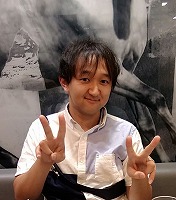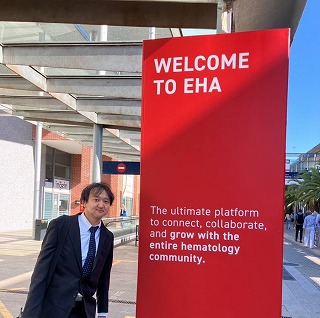29th EHA Congress Travel Award 受賞レポート 野口 和寛

名前:野口 和寛【金沢大学附属病院 小児科】
発表形式:Publication only
Title:
SPI1 is the master regulator of the small tumor cells in the small cell variant of anaplastic large cell lymphoma
Authors:
Kazuhiro Noguchi, Yasuhiro Ikawa, Hiroki Tanaka, Mika Takenaka, Yuta Sakai, Toshihiro Fujiki, and Taizo Wada
Affiliations:
Kanazawa University Hospital, Pediatrics, Kanazawa, Japan
Abstract:
Background: Small cell variant of anaplastic large cell lymphoma (SC-ALCL) is a subtype of anaplastic lymphoma kinase (ALK)-positive ALCL that shows chemoresistance and poor prognosis. Recent advances in targeted therapies have shown significant responses in various chemoresistant hematological malignancies. To establish novel treatment strategies for overcoming SC-ALCL, it is crucial to elucidate the underlying oncogenic mechanisms and identify potential therapeutic targets. SC-ALCL has two distinct tumor cell populations: small tumor cells demonstrating negative to weak ALK and CD30 protein expression, and large tumor cells with robust expression of these proteins. We previously reported that small tumor cells display resistance to chemotherapy. However, the mechanisms underlying chemoresistance and the molecular characteristics of small tumor cells remain elusive.
Aims: This study aims to elucidate the molecular attributes of small tumor cells and pave the way for developing innovative treatment approaches.
Methods: Patient blood samples diagnosed with SC-ALCL leukemic presentation and publicly available RNA-seq data from eight ALK-positive ALCL cell lines were used to investigate the characteristics of small tumor cells. To separate the small and large tumor cells based on CD30 expression, CD30- a phycoerythrin antibody and a magnetic bead separation kit were used. PCR analysis confirmed the presence of the NPM::ALK fusion gene in both populations. Bulk RNA-seq analysis was performed on four samples: small and large tumor cells at the onset and at the first (mainly occupied by small tumor cells) and second (mainly occupied by large tumor cells) relapses. Gene set enrichment analysis was used to identify gene expression patterns in small tumor cells. Signature genes of small tumor cells were identified by filtering with the following thresholds: false discovery rate-adjusted P-value <0.05, and fold-change >2 compared to large tumor cells. The g: Profiler software was used to predict the transcription factors that regulate the signature genes of small tumor cells. Single-cell RNA-seq analysis was performed on small and large tumor cells at the onset to validate the characteristic gene expression in both tumor cells.
Results: Bulk RNA sequencing analysis of the four blood samples showed that the SPI1 gene was significantly upregulated in small tumor cells compared to large tumor cells. SPI1 is the highest-scoring transcription factor that controls the expression of 570 genes characterizing small tumor cells. About 70% of these signature genes overlapped with the SPI1 target genes. Furthermore, gene set enrichment analysis indicated that small tumor cells display increased multiple anti-apoptotic gene expression and decreased cell proliferation gene expression compared to large tumor cells. These observations were confirmed by integrated gene expression analysis using RNA-seq data from eight ALK-positive ALCL cell lines (Fig.). Single-cell RNA-seq analysis validated the high expression of the SPI1 gene and SPI1 target genes in small tumor cells.
Summary/Conclusion: Our results conclude that the SPI1 gene as the master regulator to determine the distinct features of the small tumor cells in SC-ALCL. These findings shed light on new possibilities for treating SC-ALCL through innovative strategies such as SPI1-targeted therapy.
EHA2024参加レポート
この度はJSH-EHA Travel Grantを授与下さり誠にありがとうございました。
非常に大きな国際学会を現地で体感できました。スペインのマドリードというとても歴史のある綺麗な街に,様々な国籍の先生が集結し,血液疾患の治療・病態解明という同じ目標をもって集まり議論する現場は,とても熱量があり,印象に残りました。異なる文化や国籍や言語でも,血液学という共通点で親しく繋がりわかり合えることを実感しました。ヨーロッパ血液学会は初めて参加させていただきましたが,英語が母国語ではない様々な国籍の先生方が,非常に流暢に英語でコミュニケーションをとられている姿をみて非常に鼓舞されました。
様々な先生方の御発表や御講演を拝聴し,現在注目されている治療や病態に加え,現在まだ広く知られていない知見に関して精力的に研究されている報告が多いこともとても印象的でした。臨床医学的なセッションでは最先端の考え方・情報に触れることができ,基礎医学的な側面を多分に含んでいるセッションでは,全く知らなかった事象や解析手法をわかりやすく解説され,最先端の基礎研究に触れることができました。臨床面でも基礎研究面でも学びの大きい学会でした。
今回の国際学会で最も印象的だったのはTravel Grantをいただいた同年代の先生方とお話できたことです。先生方は私よりも広く深く分子生物学的な研究手法やドライ解析に精通されていて,素直にたくさんの知りたいことを聞いて学ぶことができました。論文投稿や研究費獲得に関する手法やお互いの研究施設における研究生活についても情報交換でき,こんなにもがんばっている先生方がおられるのだから自分もより一層精進しようとモチベーションが向上しました。
私は小児血液がん患者さんの診療をしながら,ALK陽性未分化大細胞リンパ腫という小児に多い大型腫瘍細胞からなる悪性リンパ腫の病態解明・治療開発を目標に研究を行っています。ALK陽性未分化大細胞リンパ腫の中でも予後不良な亜型である“small cell variant”は小型腫瘍細胞が大型腫瘍細胞に混在することが特徴で,この小型腫瘍細胞が予後不良につながっていると考え,患者検体を用いた研究・報告を行って参りました。今後は,患者検体を用いた解析で解明した事象を基礎実験で一般化していきたいと考えています。また,解明した事象に基づく新規治療法の開発・研究も行って参りたいと思っています。今回,国内の先生方とつながることができ,国外の先生方ともディスカッションすることができ,自分の中でとても成長できた国際学会でした。今後,研究を進める上で大変重要な経験となりました。今回得られた経験を活かして,血液疾患を患う患者さんに貢献できるように,より一層臨床・基礎研究に邁進して参りたいと存じます。
この度はこのようなご機会をお与え下さり誠にありがとうございました。重ねて厚く御礼申し上げます。
